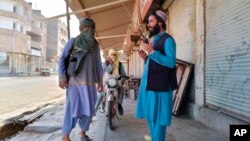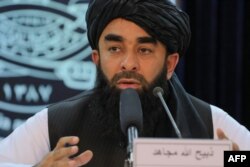Afghanistan's Taliban rulers Wednesday carried out the first public execution of a man charged with murder since returning to power, applying their strict interpretation of Islamic law, or Sharia, to criminal justice.
Taliban government spokesman Zabihullah Mujahid said the early morning execution had taken place in a sports stadium in western Farah province, with top officials, including the deputy prime minister and the foreign and interior ministers, among hundreds of spectators.
The executed person was tried in the highest Taliban courts and subsequent appellate tribunals where he had "confessed to stabbing to death" a resident of Farah and stealing his belongings, including a motorcycle, Mujahid explained.
"He was found guilty, and the sentence of retribution was enforced on the murderer," he said, noting the execution was in line with the "qisas" law, which stipulates the person is punished in the same way the victim was murdered.
"The killer was shot three times by the father of the deceased with an assault rifle," the spokesman claimed.
Mujahid argued the decision to enforce the Sharia sentence was "very carefully" examined and finally approved by Taliban supreme leader Mullah Hibatullah Akhundzada.
Amnesty International denounced the public execution as a “gross affront to human dignity” and a "major step back" by the Taliban for human rights.
“The deplorable return of public executions in Afghanistan is the latest phase in Taliban’s alarming abuse of human rights in the country,” said Dinushika Dissanayake, the watchdog’s deputy regional director for South Asia.
“Such public displays of killing perpetuate a culture of acceptance of violence, rather than a belief in justice,” she lamented. The Taliban continue to “flagrantly flout" human rights principles with "complete disregard" for international human rights law, Dissanayake said.
The execution has followed the flogging of dozens of men and women by Taliban authorities in front of hundreds of onlookers in football stadiums in the capital, Kabul, and several Afghan provinces over the past month.
The victims were accused of committing "moral crimes," such as adultery, theft, and running away from home.
Public floggings and executions were widespread under the previous Taliban government in Afghanistan from 1996 to 2001.
The radical group regained power in August 2021 as the United States and NATO withdrew all of their troops from the country after 20 years of war.
Despite repeated assurances to the international community that they would govern the war-ravaged country exclusively and respect women's rights to public life as well as education, the Taliban have brought back their harsh polices to rule the improvised Afghan nation.
Women have been ordered to cover their faces in public and not undertake long road trips without a close male relative. They are barred from entering public parks, gyms and baths across the country. Most female government staff members have been told to stay at home.
Teenage girls have been banned from attending school beyond the sixth grade across most of Afghanistan.
The restrictions on women have prevented foreign governments and the international community at large from formally recognizing the men-only Taliban government, worsening humanitarian conditions in Afghanistan and plunging its economy into a crisis.
Last month, a United Nations panel of independent experts warned that Taliban curbs on women's rights and freedoms could amount to a "crime against humanity" and should be investigated as "gender persecution" under international law.
Mujahid denounced the U.N. panel, saying criticism of their Sharia-based criminal justice is "disrespect to the holy religion of Islam and against international rules."





